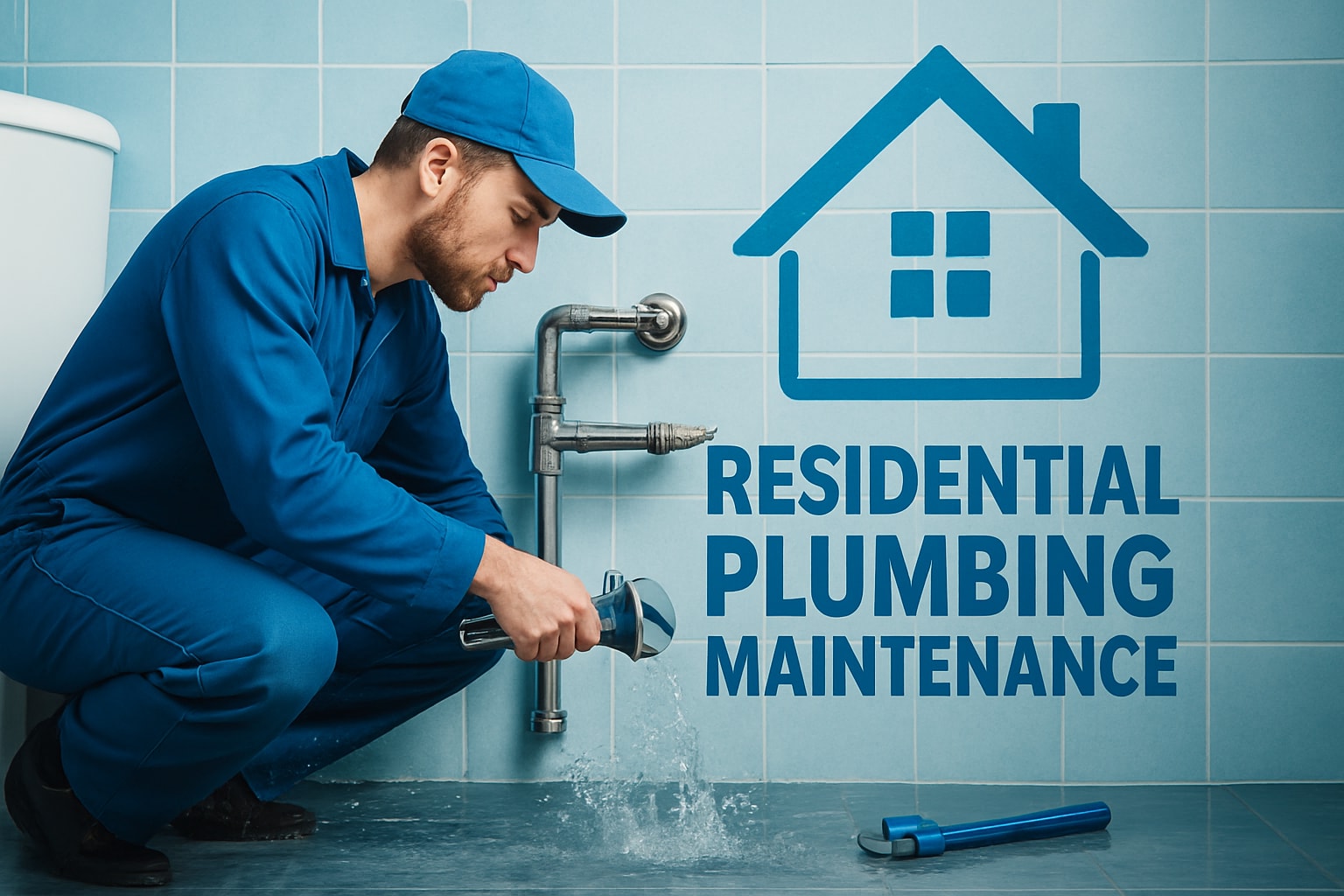Ever wake up to a surprise puddle on the bathroom floor or a cold shower that jolts you awake? Plumbing problems can turn a good day into a mess fast. Most people rarely think about their pipes until something breaks, but residential plumbing maintenance can save you from expensive repairs and wasted water. This guide will show you simple, practical steps to keep your home’s plumbing in top shape. You’ll learn what to look for, when to call the pros, and how to prevent emergencies. Got questions? Call, chat, or email us anytime—we’re always happy to help!
Understanding Your Home Plumbing System
Ever wonder what happens after you turn on a faucet or flush a toilet? Your home’s plumbing is like the veins and arteries of your house, carrying water in and taking waste out. Getting familiar with your plumbing is the first step in residential plumbing maintenance, and it can save you big headaches down the road.
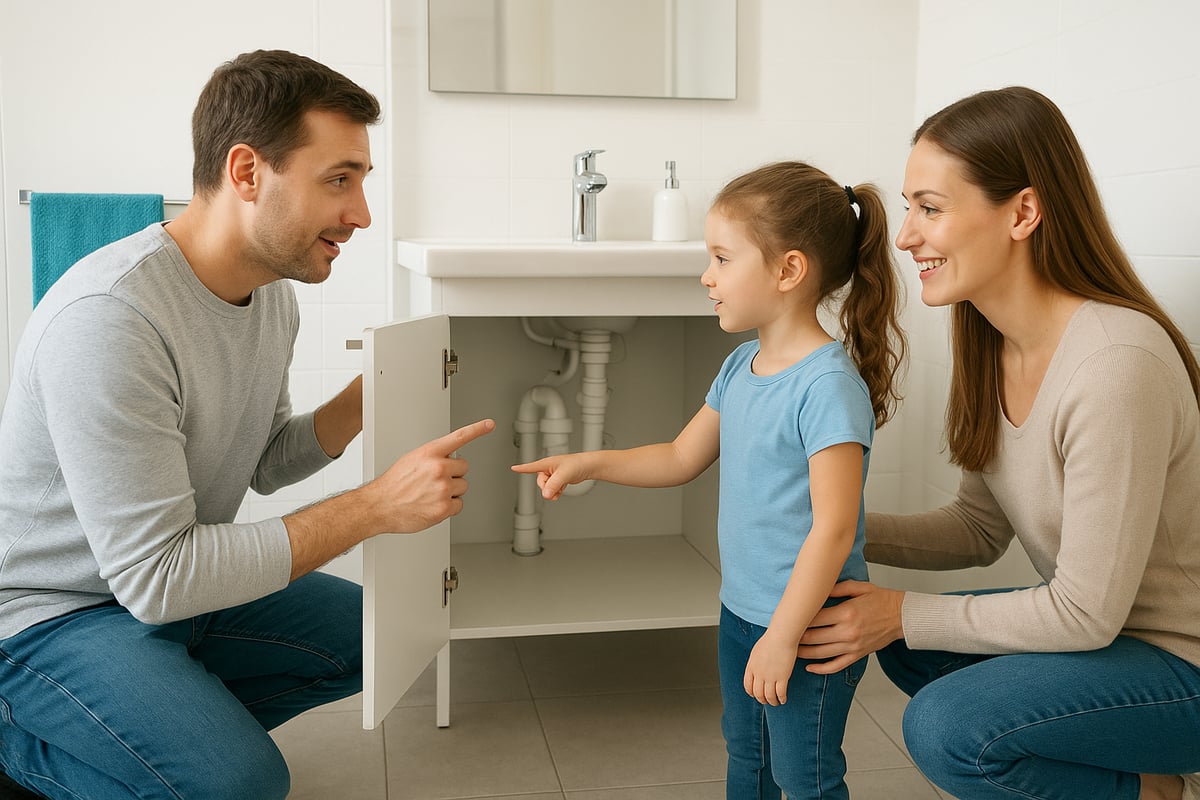
The Basics of Residential Plumbing
Your plumbing system is split into two main parts: supply lines that bring fresh water in, and drain lines that carry used water away. Pipes, valves, and fixtures like sinks and toilets all work together to keep water flowing smoothly.
For example, a small hidden leak in a wall pipe can cause damage you might not see until it’s too late. That’s why knowing where your main shut-off valve is can help prevent disasters. This is a big part of smart residential plumbing maintenance.
Common Plumbing Fixtures and Appliances
Think about all the places you use water every day: sinks, faucets, toilets, showers, and bathtubs. Each one connects to your home’s water supply and drainage system, and needs a little care to keep working well.
Don’t forget about appliances like dishwashers, washing machines, and water heaters. Something as simple as cleaning a faucet’s aerator can stop low water pressure. These steps are easy but important for good residential plumbing maintenance.
How Plumbing Problems Start
Plumbing issues don’t show up overnight. Old pipes, mineral buildup, or even tree roots sneaking into your lines can start problems. Sometimes, it’s as simple as a pipe not being installed right or big swings in the weather causing trouble.
Did you know that the EPA says about 10 percent of homes have leaks wasting more than 90 gallons of water a day? Even a tiny drip can add up to big bills and mold. Staying alert and catching these early is key for residential plumbing maintenance.
The Value of Routine Inspections
Regular checks are one of the best ways to avoid plumbing surprises. Look for rust, leaks, or stains on pipes and walls, especially if your home is older. Spotting a little corrosion today can save you from a flood tomorrow.
If you’re not sure what to check, or want extra peace of mind, you can learn more from Plumbing inspection essentials. Remember, residential plumbing maintenance is easier when you get help. Call, chat, or email us anytime with questions—we’re always glad to help!
Essential Plumbing Maintenance Checklist for 2025
Keeping up with residential plumbing maintenance doesn’t have to be overwhelming. In fact, a simple checklist can help you catch small problems before they become big headaches. Want to avoid soggy floors or cold showers? Let’s break down easy steps you can follow each month and season to keep your home’s plumbing happy and healthy.
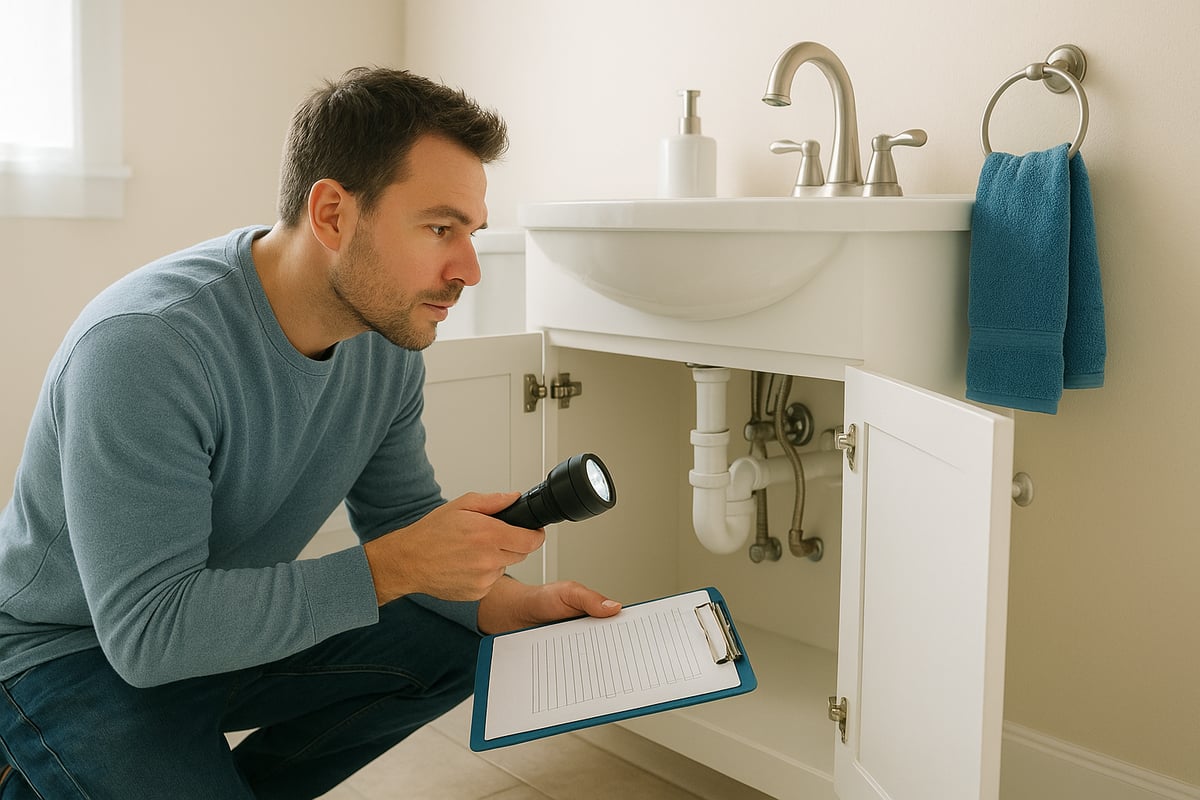
Step 1: Monthly Visual Inspections
Regular monthly checks are the first defense in residential plumbing maintenance. Start by looking under sinks, behind toilets, and near appliances for any signs of moisture or leaks.
- Check for rust, mildew, or water stains on walls and ceilings.
- Test water pressure at all faucets and showers.
- Place a few drops of food coloring in the toilet tank—if color appears in the bowl, you have a leak.
Catching leaks early can save you from costly repairs and water damage. If you see something odd, snap a photo and reach out to us by call, chat, or email—we’re always glad to help!
Step 2: Drain Cleaning and Clog Prevention
Clogs can sneak up quickly, so drain care is a big part of residential plumbing maintenance. Keep drains clear by pouring boiling water down them monthly to break up buildup.
- Use a drain snake or hair remover in bathroom drains.
- Clean sink stoppers and strainers often.
- Never pour grease, rice, or coffee grounds down the kitchen sink.
Try baking soda and vinegar for a natural clean. For more tips, check out our Preventing sewer line clogs guide. If you notice slow drains, give us a call, chat, or email for expert advice.
Step 3: Water Heater Care
A healthy water heater is key to residential plumbing maintenance. Drain and flush your water heater once a year to clear out sediment that can lower efficiency.
- Set the thermostat to 120°F for safety and savings.
- Inspect for leaks, rust, or odd noises.
- Look for reduced hot water or slow heating times.
Sediment buildup can mean fewer hot showers and higher bills. If your water heater acts up, let our team know—we handle repairs, tankless upgrades, and more.
Step 4: Pipe and Fixture Maintenance
Pipes and fixtures need attention too as part of residential plumbing maintenance. Check for loose handles or valves and tighten them if needed.
- Replace hoses on washing machines and dishwashers if they look worn or cracked.
- Test outdoor spigots and irrigation for leaks.
- Refresh caulking around tubs, showers, and sinks.
Watch for mineral deposits or discoloration—these can signal bigger issues. Not sure what you’re seeing? You can always call, chat, or email us with questions.
Step 5: Sump Pump and Sewer Line Upkeep
Don’t forget sump pumps and sewer lines in your residential plumbing maintenance routine. Test your sump pump every few months by pouring water into the pit to make sure it activates.
- Clear debris from the pit and discharge line.
- Check that discharge pipes slope away from your house.
- Avoid flushing wipes and thick paper products.
Schedule professional sewer line inspections every two to three years. Need a hand? Reach out any time—we’re happy to help protect your home from backups.
Step 6: Seasonal Maintenance Tips
Changing seasons bring new challenges for residential plumbing maintenance. In winter, insulate exposed pipes and disconnect outdoor hoses to prevent freezing.
- In spring, check for leaks after thaw and inspect your sump pump.
- In summer, monitor water use during hot spells.
- In fall, clean gutters and make sure drainage is clear.
A burst pipe from freezing can cause major headaches, especially in Atlanta’s chilly winters. If you need help with seasonal prep, call, chat, or email us for friendly advice.
Early Warning Signs of Plumbing Problems
Have you ever noticed a strange sound coming from your pipes or a slow-draining sink? These are just a couple of early warning signs that your home might need some residential plumbing maintenance. Catching small problems early can save you from big headaches later.
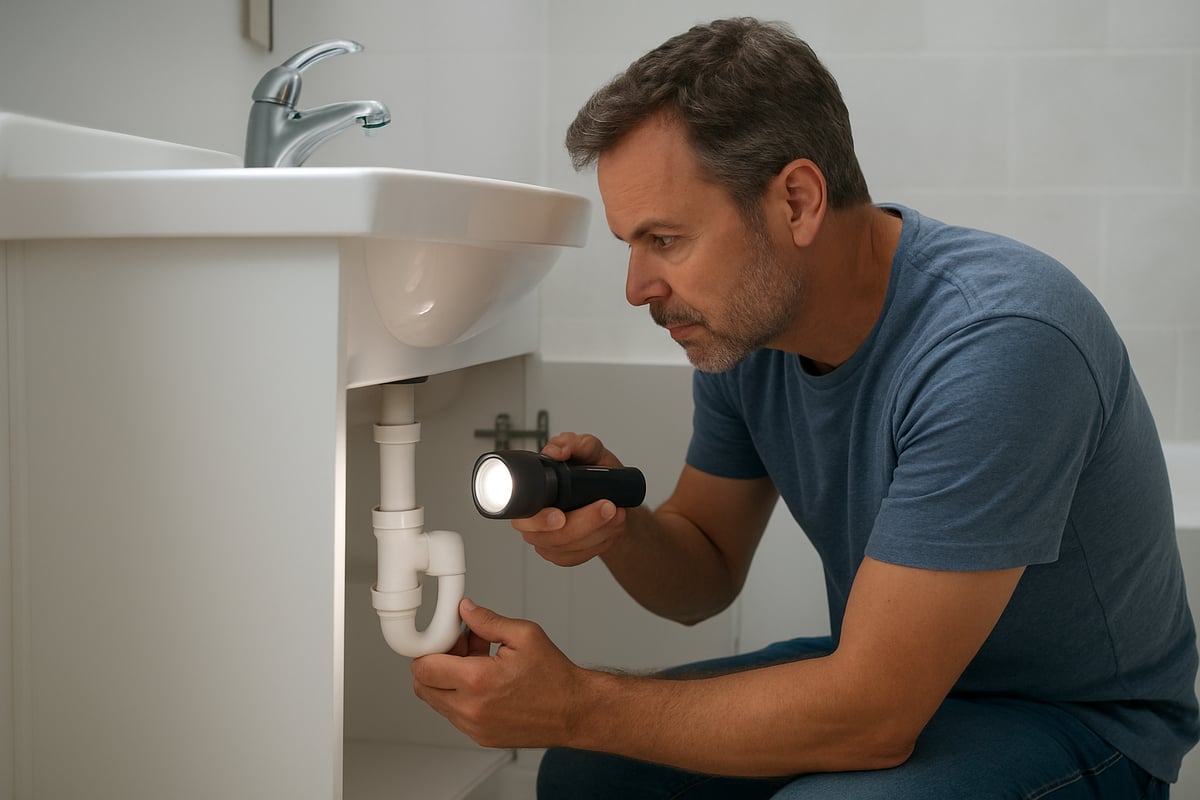
Common Red Flags in Your Home
Knowing what to look for is the first step in residential plumbing maintenance. Some warning signs are easy to spot if you know where to check.
- Slow drains in sinks, tubs, or showers
- Odd noises like banging or gurgling in pipes
- Sudden jumps in your water bill
- Water stains or musty smells around fixtures
Discolored water can mean your pipes are corroding. If you want a quick guide to more typical issues, check out these common plumbing problems in homes. Spotting these red flags early makes a big difference.
What to Do When You Spot Trouble
If you see or hear anything unusual, prompt residential plumbing maintenance is key. First, shut off the water supply if there’s a major leak. Use towels or buckets to contain small leaks and keep the area as dry as possible.
- Avoid using the affected sink, toilet, or shower until a plumber checks it.
- Take photos of the problem. This helps our team understand what’s going on.
- Remember, catching a leak early can save you thousands on repairs.
If you’re not sure what to do, don’t worry. You can always call, chat, or email us at Fix & Flow, and we’ll be glad to help.
DIY Fixes vs. Professional Help
Sometimes you can handle a small issue as part of your own residential plumbing maintenance. For example, unclogging a drain with a plunger or a hair remover is usually safe to try.
However, bigger problems like gas leaks, main pipe bursts, or sewer backups should always be left to licensed pros. Trying to fix these yourself could make things worse or even be dangerous.
When in doubt, play it safe and contact a professional plumber. Our Fix & Flow team is here for emergencies and everyday repairs, so you never have to guess.
Preventing Recurring Issues
The best way to avoid plumbing surprises is with regular residential plumbing maintenance. Make it a habit to check for leaks, upgrade old pipes and fixtures, and install water leak detectors if possible.
- Teach everyone in your house what not to flush or pour down the drain.
- Schedule annual inspections, especially if you live in an older home.
- Regular maintenance helps prevent mold and costly damage to your home.
If you want a personalized plan or have any questions, just call, chat, or email us. We love helping Atlanta homeowners keep their plumbing safe and sound.
Expert Plumbing Tips for Atlanta Homeowners
Keeping your home’s plumbing in top shape is easier than you think. With a few smart habits and the right tools, you can prevent problems, save money, and enjoy peace of mind. Here are expert tips just for Atlanta homeowners who want to get the most out of their residential plumbing maintenance.
Water Quality and Filtration
Did you know the water in Atlanta can be pretty hard? That means it carries minerals like calcium that can build up inside your pipes and water heater. Over time, this buildup can hurt your appliances and make your water taste odd.
A smart move for residential plumbing maintenance is to check if you need a water softener or filtration system. These tools help keep your water clean and healthy, so your family and plumbing are protected. If you notice white spots on your faucets or a chalky film on dishes, it may be time to upgrade your water filtration. Fix & Flow can help you choose and install the right system, and we’re always happy to answer your questions by call, chat, or email.
Energy Efficiency and Water Conservation
Saving water and energy is good for your wallet and the planet. Upgrading to low-flow fixtures or faucet aerators can make a big difference. These devices use less water but still give strong pressure, so you won’t even notice a change in your shower. Curious how they work? Learn more about low-flow fixtures and how they can help with residential plumbing maintenance.
Switching to energy-efficient or hybrid water heaters can cut your bills, especially if you fix leaks quickly. Even a small drip can waste hundreds of gallons each month. Need help choosing the best upgrades? Our team can guide you or handle the installation for you.
Remodeling and Upgrades for Modern Living
Have you thought about giving your kitchen or bathroom a fresh look? Remodeling is a perfect time to tackle residential plumbing maintenance. Newer toilets, smart faucets, and modern showers not only look great but also use water wisely.
Consider a touchless faucet for extra hygiene or a water-saving toilet for lower bills. If you’ve had leaks or clogs in the past, a remodel can fix those issues for good. Check out our bathroom remodeling page for ideas, or just ask us for advice. We love helping Atlanta families create homes that work better for them.
When to Call the Professionals
Some plumbing jobs are easy to handle, but others need a pro. If your home has low water pressure, recurring leaks, or a water heater that isn’t working right, it’s time to call Fix & Flow. We’re experts in residential plumbing maintenance, and we use special tools to find problems fast.
You can reach out to us by phone, chat, or email, and we’ll explain what’s going on in simple language. We even offer 24/7 emergency services for those big surprises. Remember, it’s always better to ask for help than let a small problem turn into a big mess.
Why Choose Fix & Flow Plumbing Co. in Atlanta?
Fix & Flow is proud to serve Atlanta with quality, reliable residential plumbing maintenance. Our licensed plumbers know the ins and outs of local homes, from repairs and inspections to remodeling and emergency response.
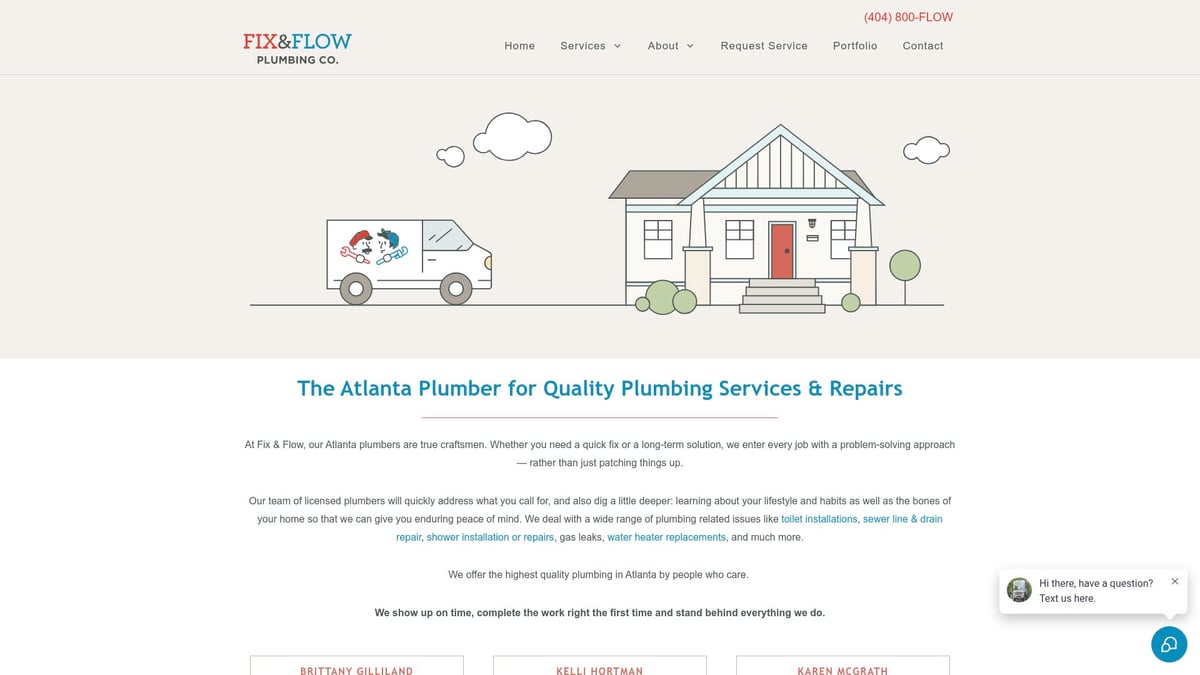
We offer a 10% discount for first responders, teachers, military, and veterans. Every home is different, so we listen to your needs and find the right solution. Have a question about your plumbing? Call, chat, or email us anytime. We’re always glad to help Atlanta families keep their homes safe and comfortable.
Frequently Asked Questions: 2025 Plumbing Maintenance
Curious about residential plumbing maintenance? You are not alone. Many Atlanta homeowners have similar questions. Here are answers to the most common ones, so you can keep your plumbing in top shape and avoid surprises.
How Often Should I Inspect My Plumbing?
You should check your plumbing every month with a quick look under sinks, around toilets, and near appliances. Annual professional inspections are also a must for good residential plumbing maintenance, especially if your home is older or you have had issues before.
Atlanta weather can be tough on pipes, so regular checks help catch leaks or rust early. For example, winter freezes might cause pipes to crack, leading to unwanted surprises. If you are not sure what to look for, our plumbing inspections service can help you spot trouble before it becomes a problem.
What Are the Most Common Plumbing Issues in Atlanta Homes?
Some top plumbing problems in Atlanta include leaky faucets, running toilets, slow drains, and water heater troubles. Hard water and tree roots can also mess with pipes and cause clogs. After heavy rains, sewer lines can get backed up, leading to big headaches.
According to Plumbing Industry Statistics 2025, homeowners nationwide spend a lot on repairs, so catching issues early with regular residential plumbing maintenance can save you money and stress. If you notice any of these issues, check out our sewer & drain services for fast help.
Can I Perform Maintenance Myself or Should I Call a Pro?
There are plenty of simple tasks you can do yourself as part of residential plumbing maintenance. You can clean out sink stoppers, check for leaks, and replace worn-out washers. If you spot a minor clog, try using a plunger or a safe cleaning mix of baking soda and vinegar.
However, call a pro for big jobs like gas leaks, major water heater problems, or if the same issue keeps coming back. Professional help means the job gets done safely and lasts longer. For peace of mind, our plumbing inspections are always available.
How Can I Prevent Plumbing Emergencies?
The best way to avoid emergencies is with proactive residential plumbing maintenance. Fix small leaks quickly, insulate pipes in winter, and do not flush things like wipes or pour grease down the drain. You can even install leak detectors or smart shut-off valves for extra protection.
Water damage can be very expensive, with Water Damage Claims Statistics showing costly claims each year. Teach everyone in your home what not to flush or pour away. If you want a custom plan or have questions, just call, chat, or email us. We are always happy to help!
So, now that you know what to look for and how to keep your home’s plumbing in top shape for 2025, what’s your next move? If you want peace of mind or you’ve spotted something that doesn’t feel quite right—don’t wait until it becomes an expensive problem. The team at Fix & Flow Plumbing Co. is here in Atlanta, ready to help with everything from quick inspections to major repairs. Why not take the guesswork out of it and let a pro take a look? You can easily Book Appointment and get ahead of plumbing surprises before they disrupt your day.
